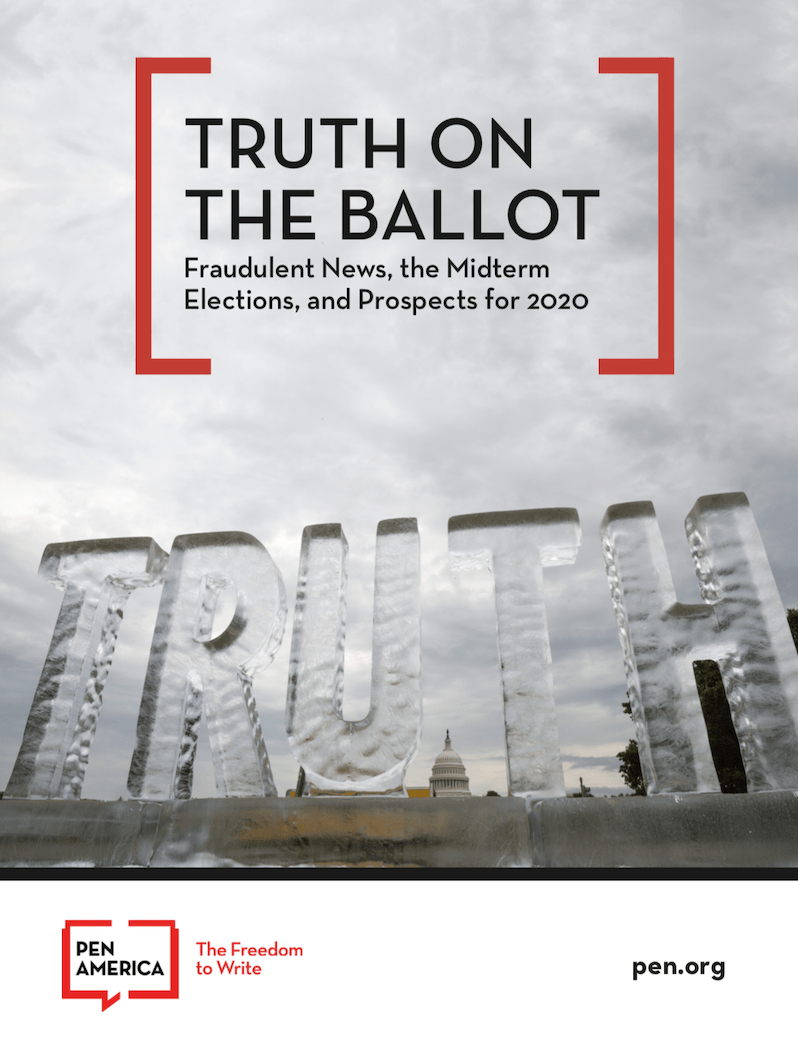Truth on the Ballot: Fraudulent News, the Midterm Elections, and Prospects for 2020
 With fraudulent news and online disinformation distorting public discourse, eroding faith in journalism, and skewing voting decisions, Truth on the Ballot offers a stark warning about the normalization of fraudulent news and disinformation as campaign tactics, sounding an alarm that such unsavory methods are becoming part of the toolbox of hotly contested modern campaigns. Micro-targeting capabilities have weaponized disinformation, so that what might once have passed muster as simply a hard-edged campaign message in the public arena can now move with stealthy, laser-like efficiency to reach sub-segments of voters while remaining invisible to the wider public or opposing campaigns.
With fraudulent news and online disinformation distorting public discourse, eroding faith in journalism, and skewing voting decisions, Truth on the Ballot offers a stark warning about the normalization of fraudulent news and disinformation as campaign tactics, sounding an alarm that such unsavory methods are becoming part of the toolbox of hotly contested modern campaigns. Micro-targeting capabilities have weaponized disinformation, so that what might once have passed muster as simply a hard-edged campaign message in the public arena can now move with stealthy, laser-like efficiency to reach sub-segments of voters while remaining invisible to the wider public or opposing campaigns.
READ THE FULL REPORT »
READ THE FULL REPORT—MOBILE FRIENDLY »
Truth on the Ballot builds on PEN America’s October 2017 report, Faking News: Fraudulent News and the Fight for Truth, which examined how fraudulent news is eroding truth-based civic discourse and constitutes a threat to free expression. At the time, the majority of public concern over fraudulent news fixated on foreign actors, including Russian disinformation agents and Macedonian clickbait farms. While foreign-originated disinformation remains a serious concern, Truth on the Ballot warns that domestic actors are increasingly experimenting with fraudulent news and information as a bare-knuckled political tactic.
Truth on the Ballot underscores the need for increased transparency regarding the funding of political ads, analyzing steps that technology companies have taken to address the problem and judging them often important, but insufficient. Additionally, the report reviews some of the most significant examples of fraudulent news during the 2018 election cycle and discusses how such disinformation shapes public discourse.
In addition to recommendations for technology companies, legislators, and political groups, Truth on the Ballot contains the first-of-its-kind Model Pledge Against Fraudulent News, a call to action for candidates and political parties to denounce fraudulent news and disinformation, and forswear its use. The Pledge also serves as a tool to empower citizens to take action and hold their elected officials and aspirants for public office accountable.
KEY CONCLUSIONS
- Russian disinformation continues to be a salient threat to our elections, and Russian agents of disinformation are playing a ‘long game’: their focus is not merely on influencing American electoral processes, but on stoking political polarization and sowing distrust in democracy.
- In the past two years, experts and observers have noted a worrying increase in instances of domestic disinformation, with American political actors utilizing fraudulent news and disinformation against political opponents.
- Today, perhaps the greatest threat that fraudulent news poses is the risk that it will become a normalized part of U.S. political discourse. There is a real danger that fraudulent news may become the new normal: a distasteful, but not disqualifying political tactic.
- Technology companies have made significant efforts to reduce the spread of fraudulent news, the results of which are mixed: While important advances have been made, many efforts remain insufficient, while others have caused new problems. Voluntary efforts by technology companies to ensure transparency regarding advertisements on their platforms have so far proven insufficient to prevent their manipulation.
- Micro-targeting capabilities on the platforms have weaponized disinformation, so that what might once have passed muster as simply a hard-edged campaign message in the public arena can now move with stealthy, laser-like efficiency to reach sub-segments of voters while remaining invisible to the wider public or opposing campaigns.
- While both human and automated content review are subject to bias, some combination of the two is likely the most reasonable approach. It is imperative that the platforms that host such a vast portion of our political discourse supplement their current tools with greater numbers of qualified, trained, and sufficiently supported personnel to evaluate content, exercise judgment, and adapt to fast-changing threats.
- Fraudulent news and disinformation in the 2018 midterm election cycle tended to have one of a few objectives: attacking individual candidates, dampening turnout or stoking distrust in the voting process, or amplifying a desired narrative about a particular political event. Key examples of the latter included disinformation regarding the confirmation hearing of Supreme Court Justice Brett M. Kavanaugh and the contingent of Central American migrants that moved toward the United States in the fall of 2018.
- During elections, individual candidates, political parties, and party committees have a critical and fundamental role in protecting the integrity of our civic discourse and the public’s ability to make informed decisions about who will represent them.
- Empowered consumers of information are society’s best defense against the scourge of fraudulent news and attempts to undermine the role of truth in our society. Efforts to equip citizens to distinguish truth from falsehoods and make informed political decisions are therefore critical to curbing the impact of fraudulent news.
MODEL PLEDGE AGAINST FRAUDULENT NEWS
As public servants, figures placed in a position of authority in American politics, and aspirants to positions of public trust, we recognize our solemn duty to the American people to promote and uphold the highest standards of public service in our party’s candidates. This duty includes a respect for the truth. The American people deserve leaders who are committed to the value of truth in our public discourse, regardless of political affiliation or ideology.
Fraudulent news—demonstrably false information that is being presented as fact in an effort to deceive the public—is harmful to our democracy. We denounce fraudulent news as contrary to the values of our republic and disrespectful to our citizens, who rely on factual information to make reasoned decisions. We recognize that fraudulent news is illegitimate and abhorrent, and must never become an acceptable political tactic.
Accordingly, we publicly pledge:
- To refrain from creating, disseminating, promoting, or encouraging fraudulent news. In situations where we have mistakenly shared or promoted news that we later learn to be fraudulent, we will acknowledge our mistake and make a prominent public statement that such news is false.
- To insist that our party’s candidates for public office make similar commitments.
- To denounce fraudulent news—including when it is directed at a political opponent or promoting a political cause that we support.
- To reject the support of those who deliberately create or disseminate fraudulent news, regardless of their role in our causes or campaigns.
- To refuse to endorse any candidate for public office who has disseminated fraudulent news or has refused to condemn fraudulent news disseminated by any organization supporting their candidacy.
Read the full report »
READ THE FULL REPORT—MOBILE FRIENDLY »
Expert Contacts
Summer Lopez
Senior Director of Free Expression Programs
Contact »
James Tager
Deputy Director, Free Expression Research and Policy
Contact »


